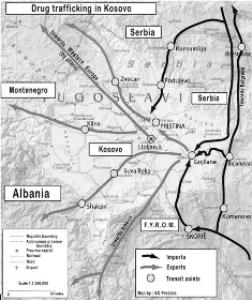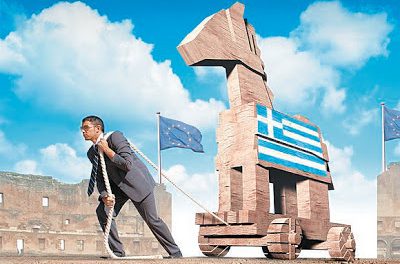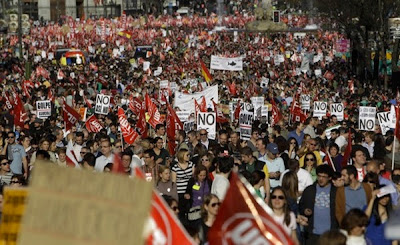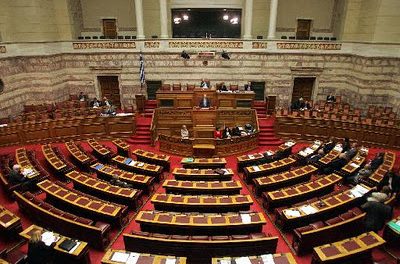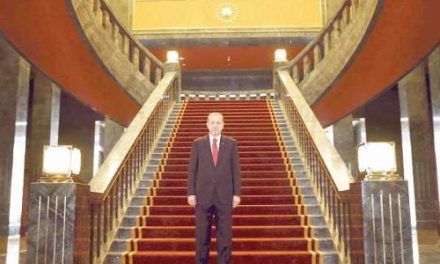The strongest passion in the world is jealousy, but the sweetest is revenge.
An old Cossack saying
Do not envy a sinner; you don't know what disaster awaits him.
Bible
Kosovo's independence proclamation by the Albanian secessionist administration in Pristina in February 2008, follows a course that was drafted back in March 1999 when NATO started a war against the then Yugoslavia and more specifically against Serbia, who at that time composed more than 90% of Yugoslavia.
Although a decade has passed and numerous efforts have been made by the international authorities, along with a tremendous cash-flow of aid; Kosovo is viewed as a region that is under the tight grip of organized crime and corruption which spans through he entire social and political sphere. This article examines the situation in Kosovo in relation to the dependence of the region with drug trafficking.
In Kosovo, the main managers of illicit drugs are the so-called «15 families» which represent the core power of the state, because of their financial clout and political connections. Reports by the German intelligence service in 2005, described the former Prime Minister of Kosovo Ramous Haradinaj as related «in drug trafficking, extortion and protection business». The German authorities found «The interdependence of the political leadership in Pristina organized crime and the latter's desire to prevent the formation of a stable political climate, to constantly monitor the government».
Finally the Germans analysts warned for «serious risks from the ongoing corruption in Kosovo in relation to other Balkan countries and the security of the region».
The EU report in 2007, underlines the «inability of local officials to put pressure on criminal organizations and the serious risk of collapse of the social system because of the crime issue». The main reason is «The lack of political will by the leadership», which paradoxically it is fanatically supported by most major European countries. The German report specifically mentioned the name Niam Behzloulzi, a Kosovo smuggler and number two in the hierarchy of the former UCK, and a possible explosives supplier «In London and Madrid attacks». American journalist John Gizzi confirmed that information and added that «The origin of the ammunition of these terrorist acts was Kosovo».
The Italian newspaper La Republica in a research on the situation in the region, states for the Kosovo criminals, of their ability to fully exploit the lack of «political culture» in the region and affect every key decision over and above the international force which does not control the situation. The current leadership under Hashim Thaci is to emerge from the unholy alliance of traffickers in the region and the UCK. Michel Koutouzis, an expert analyst on security issues in Paris has long confirmed that the Pristina government has always been « subject to the power of the Mafiosi who were the largest donors of the KLA rebels and want to keep the region in their own sphere of influence».
The former Commander of KFOR, the Italian General Fabio Mini, said in late February 2008 in the newspaper Corriere dela Serra, that «Kosovo will become the new location for the laundering of black money coming from the East and new financial institutions will be created that will take this role ». Similar reports have been made by the Canadian General Mackenzie, who served in Bosnia as peacekeeper official and has dealt closely with the situation in the Balkans over the last decade.
Reliable and highly informed sources at the Institute for European Policy, based in Germany, in a 2007 last report, commissioned for the German Armed Forces, indicated that the three leading Kosovo politicians, Ramush Haradinaj, Hashim Thaci and Xhavit Haliti are «Persons protected by the international community although they are deeply involved in all of these affairs». It is important to mention at this point that the former commander of UNMIK Soeren Jessen Petersen has maintained close contacts with the aforementioned politicians and the German report states that the UN contacts with Albanian politicians was part of the overall problem for the region.
Local sources, including U.S. military personnel, indicate that at least 90% of the local economy derives from criminal networks -bar Diaspora remittances- and the society is unable to adapt into the conditions of free and legal market because of the dramatic social consequences that will entail. Today, unemployment is estimated at 50% of the population which grows with 35,000 births per year, more than three times the average Western European rate. The explosive mixture of crime, lack of employment opportunities and a significant youth segment in comparison with the total population is a ticking bomb that will explode in the not-so-distant future.
A very important report of the United Nations in 2006 in collaboration with the Ministries of Foreign Affairs of Britain, Netherlands, USA and Sweden revealed that «The people of Kosovo find as main threats to themselves corruption and organized crime» as well as the very likely possibility of a «Full seizure of the state institutions by criminals».
Moreover an issue directly associated with the European security architecture is the strong collaboration between Turkish, Kosovo and Middle Eastern narcotics smugglers. Already in 2000, according to Interpol Kosovo criminals, money laundered their illicit profits of 2 billion Euros through more than 200 banks. The current data show much higher earnings and this without considering the investments in the building sector, the purchase of shares and other activities.
Marko Nicovic, the former Chief of Police in Belgrade and a recognized Balkan crime analyst notes that «About 500 Kosovo Albanians assume transport of 20 kilos of heroin across to Europe, while another 5,000 Albanians deal with lesser quantities». In a Pan-European level perhaps two-thirds of the heroin sold in the streets it is being distributed by Albanian criminal syndicates which are mostly established in Kosovo.
Further another crucial element is the existence of a strong Albanian-American lobby in the U.S. East Coast which is interlinked with the still powerful American-Italian Mafia and quite a few mainstream politicians and bureaucrats. This lobby is also a small part of the wider nexus between Pakistan-Saudi Arabia-Turkey business lobbies n Washington that have managed to pursue high politics mainly in the Pentagon and the State Department through the use of retired American Generals and diplomats, attaining great influence even at the expense of the national interests of the USA.
In addition, the American continent presents another point of interest and this is the dimension of Colombia. For the past five years the Kosovo Albanians have taken over much of the cocaine imports to Europe and have forged ties with the Colombian cartels. This trend will strengthen as it appears because of the internal infight within the Kalabrian N' Dragheta groups.
The attitude of the international community and particularly the U.S. in all these developments has caused widespread criticism. According to the U.S. law, "US Foreign Assistance Act of 1961", aid is prohibited to any country or organization that it is involved in drug trafficking. It is noteworthy to emphasize the involvement of the DEA at this point. Until March 1999 it followed a clear-cut policy of repression against the Kosovo related drug crime, but a month before the NATO bombing it pulled down from its own website references connected to Kosovo.
According to Alain Labrousse, a former director of the International narcotics Observatory, «The DEA was found at a very difficult position at this point». In fact the anti-drug policy was subject to political machinations and that was a significant blow towards any combat of organized crime in the Balkans.
The smuggling of weapons from Kosovo is still a dangerous phenomenon that involves other countries. Part of the surplus of weapons and explosives when the 1999 UCK fighting stopped, found their way to Chechnya through Turkey with the help of the Islamic organization Kvadrat, which maintained bases in Bosnia. There are also quite a few sources that point out towards weapons smuggling from Kosovo to Iraq in order to arm Iraqi guerillas after 2003.
Also, the attack on the American Embassy in Athens-Greece on 12/01/07, had a Kosovo connection, since Greek Police circles and journalists at that time, confirmed to the press that the RPG that hit the target was originally from the triangle Pristina-Kukes-Tetovo. Finally, the attack in London in July 2005 with semtex explosives was according to many sources attributed to Kosovo weapons smugglers that sold these types of plastic explosives. There are similar references for the Madrid bombings as well and in both cases the role of Bosnia is highlighted also.
The direct relationship between the Kosovo Mafia and Islamic terrorism was made explicitly visible in September 2006 when the Pakistani national Arfan Qadeer Bhatti, was arrested in Oslo-Norway trying to blow up the Israeli and the American Embassies there.
He had visited several times Pristina and met with Princ Dobrosi, a well connected on political terms drug merchant in Kosovo.
The American analyst Chrostopher Deliso, described that NATO forces in Afghanistan have retrieved Taliban satellite phones in hideouts inside mountain caves. After technical examination it was revealed that those Afghani fighters had called repeatedly numbers in the Balkans and Kosovo presumably over the past few years.
The authoritative analyst on security Michel Chossudovsky says that «Drenica-Group founded by Thaci controls about 10-15% of all criminal activities in the country». References have been made in previous years by the media and organizations like Heritage Foundation, Christian Science Monitor, Washington Times, and BBC. In fact there has been such a detailed account of the role of the Kosovo mafia in the transnational organized crime, that it is incomprehensible that decisive action has not been taken yet to counter this "asymmetrical threat".
The main assumption that can be concluded is that Kosovo is in a very delicate position regarding its role as a European crime hub and that the efforts of the international community over the past decade have been on the wrong direction. Gradually it is becoming more evident that the declaration of independence does not serve the interests of the majority of the UN member states and another resolution is needed before Kosovo becomes a failed "Non-state".
Sources:
– United Nations Development Program: Special Report on Kosovo–
– SWP Institute " Die Balkan Mafia" Report
– BND Report– Operationalisierung von Security Sector Reform (SSR) auf dem Westlichen Balkan -intelligente/kreative Ansätze ftir eine langfristig positive Gestaltung dieser Region
– EU Kosovo Report
– "The Threat of Radical Islam to Europe and the West", Christopher Deliso, ISBN: 0-275-99525-9, Praeger Security International
– International Relations & Security Network
– "Kosovo Albanian implicated in Norway terror", www.serbianna.com (27/07/2006)
– "Kosovo the black hole of Europe", www.antiwar.com (14/11/2006)
– "Former NATO commander in Kosovo: Recognition of Kosovo Independence a big mistake on EU's part", SRNA News Agency (17/02/2008)
– American Hellenic Institute "The Road to Peace in the Balkans is Paved With Bad Intentions"
ahiworld.org/pdfs/Speech_Copley.pdf

